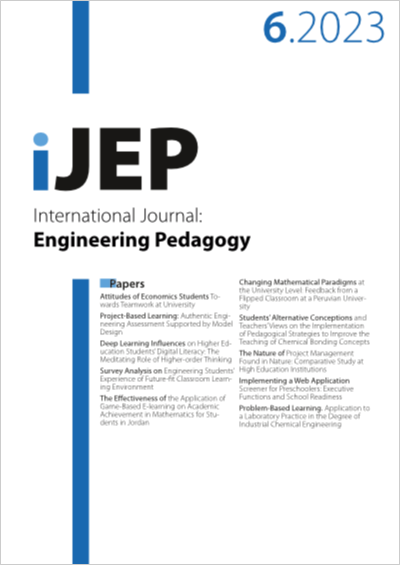Project-Based Learning: Authentic Engineering Assessment Supported by Model Design
DOI:
https://doi.org/10.3991/ijep.v13i6.38539Keywords:
project-based learning, authentic assessment, mathematical modelingAbstract
In this study, we examined the effects of project-based learning (PBL) on student learning outcomes related to the subject of signals and systems in the field of electronic engineering at the Universidade Estadual de Campinas (UNICAMP) in Brazil and at the Pontificia Universidad Javeriana (PUJ) in Colombia. We used two methods to assess the effect of PBL on student outcomes: (1) we used the Signals and Systems Concept Inventory (SSCI) to measure the increase in conceptual understanding of signals and systems among electronic engineering UNICAMP students as a consequence of implementing PBL; and (2) we compared the results on a comprehensive signals and systems final exam of a group of electronic engineering students at PUJ who received PBL to those who did not. Results indicated that (1) UNICAMP students achieved outcomes comparable to those of Buck and Wage’s study: UNICAMP students taught with projects learned more than students in 15 Signal and Systems lecture-based courses in the United States; and (2) PUJ students taught with projects received higher final exam grades than students taught via lectures. Students were able to apply their knowledge of signal processing and systems analysis using MATLAB models. These models provide authentic assessments of engineering students’ knowledge and skills. The findings of this study indicate that PBL is more effective than lectures in enhancing students’ understanding and application of signals and systems concepts.
Downloads
Published
How to Cite
Issue
Section
License
Copyright (c) 2023 Dr. Jairo A. Hurtado, Dr. Ana C. Useche, Dr. Bruno Masiero

This work is licensed under a Creative Commons Attribution 4.0 International License.


